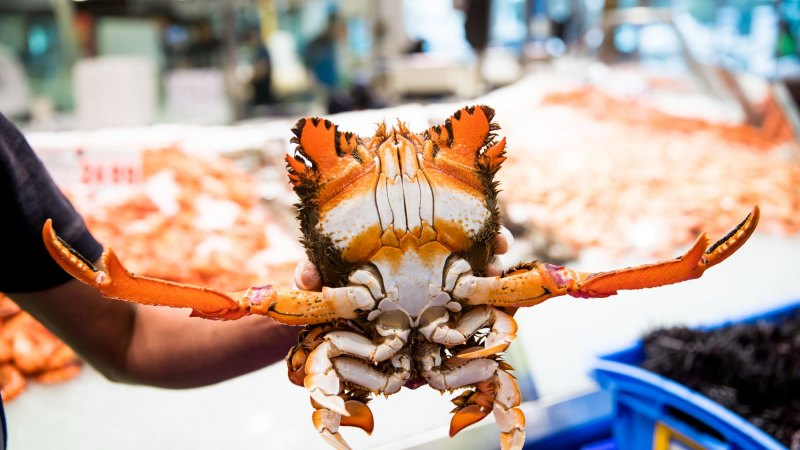Why I’m the catch of the day when it comes to my marriage

Save articles for later
Add articles to your saved list and come back to them any time.
Jocasta has finally given up her habit of spelling things out when talking in front of our dog. For years, she said “Is it time to go to the P.A.R.K?” Or “Do you have time to give Clancy his D.I.N.N.E.R?” .
Two problems have emerged. First: Clancy, over time, has clearly learnt to spell. At just two or three years of age, he took to running towards the door on the mere mention of P.A.R.K, and would salivate on the final letters of N.E.R.
A spanner crab waves his salutations at the Sydney Fish Market. Credit: Edwina Pickles
Maybe he just associated that final plosive “K” in park with a visit to the park, but I also think there’s a chance he’s fully literate, with a copy of the Macquarie Dictionary hidden in his dog bed and a secret contempt for the way Man and Lady sometimes confuse “less” and “fewer”.
Actually, I take back that sentence. Perhaps Man confuses “less” and “fewer”, but never Lady. Apologies to Jocasta.
The second problem is me. I’m slightly dyslexic and not a gifted speller, and so tend to frown and squint whenever anybody starts throwing around what appear, for me, to be random letters of the alphabet.
Igmar Bergman made a bleak film in the 1970s called Scenes From a Marriage, and this is the bleakest scene from our marriage: the moment when Jocasta realised her dog was comprehending her spelt-out words faster than her husband. When Jocasta said “P.A.R.K”, Clancy would be already wagging his tail, while I’d be thinking, “P, then A, plus an R….”
Richard Glover and his wife, Jocasta, when she still found him charming.
So, Jocasta no longer spells out things in front of the dog. But she’s not given up on spelling words. She’s now doing it in front of our grandson Pip.
On this particular day, she wants to float the idea of taking him on an excursion to the fish market. The fish market is Pip’s favourite place in all the world, especially since you get there on a train, which is his second favourite thing in the whole world.
It would be madness to speak out loud about this potential trip because once Pip hears the words “fish market” there is no known universe in which a trip to the fish market will not immediately follow – including the live lobsters, the colourful fish, plus the perfectly normal fruit and veggie shop, which, for no good reason, is spectacularly interesting if you happen to be Pip.
That’s why Jocasta, seeking my opinion, spells out her query: “Do you think we should attempt a trip to the F.I.S.H.M.A.R.K.E.T.?”
True, the trip was her idea, but here’s the thing: it was my method of actively expressing her idea that turned it into a done deal.
Now, the words “fish market” are so much more complicated than the words “park” or “dinner”. It leaves me discombobulated. It leaves me as discombobulated as if Jocasta, on a whim, had asked me to spell “discombobulated”.
As a slight dyslexic, all I hear in this fish market moment is Jocasta saying “How about we go to the” …. and then a series of jumbled letters. She could be suggesting a trip to ISIS headquarters for all I know. Maybe she’s having a seizure and saying random letters. I just don’t know.
Yet here’s a thought that might raise your spirit. The person with slight dyslexia (maybe more than slight; give me a break here) does not give up. We are a noble people. Our dyslexia is associated with creativity. We just need a bit of time. My brain is a library, with many floors. I just need to apply to the front desk, and one of the helpful librarians whom I employ to run my brain will find the location of the necessary information.
True to form, eventually the librarian comes good. I told you: it just takes time. There’s only one problem. I’m so delighted when the information is finally delivered, that I blurt out the finding: “Ah, the fish market”. Then I compound my error: “You’re asking whether we should go to the fish market!”
Pip then pops up: “Fish market! Yes, let’s go to the fish market. On the train. The fish market. I love the fish market.”
Jocasta flashes me a look of exhaustion, the sort of deep exhaustion that comes from living with a man – well, me – for longer than can be easily imagined.
Of course, we immediately go to the fish market and a marvellous time is had by all. People are so friendly. We see crabs and lobsters and fish that are larger than Pip. A man shows Pip how he prods the lobsters to check they’re still alive, then removes the few that are dead.
What a day we have!
Pip has recently begun calling Jocasta “my Nana”, rather than just “Nana”. It’s presumably a developmental stage since he’s realised that other people have grandmothers, so it’s best to identify the precise one you mean.
So, he says: “My Nana, I love the fish market.” And Jocasta smiles fit to burst. She’s so delighted we made this trip.
True, the trip was her idea, but here’s the thing: it was my method of actively expressing her idea that turned it into a done deal. And once the train delivers us home, I might remind Jocasta of my role in the whole glorious day.
In any relationship, it’s worth taking the time to spell out your own V.I.R.T.U.E.S.
The Booklist is a weekly newsletter for book lovers from books editor Jason Steger. Get it delivered every Friday.
Most Viewed in Culture
From our partners
Source: Read Full Article

